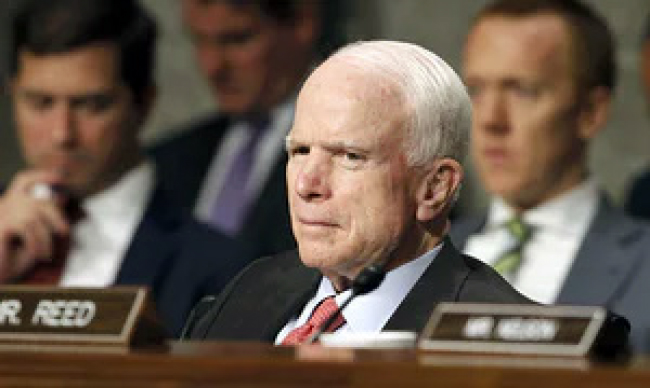WASHINGTON - Proposing a new strategy, a top American Senator Thursday called for a civil-military approach to bolster counterterrorism efforts, strengthen the capability and capacity of the Afghan government and security forces, and intensify diplomatic efforts to facilitate a negotiated peace process in Afghanistan in cooperation with regional partners – supported by an enduring US troop presence.
“America is adrift in Afghanistan. President Obama’s ‘don’t lose’ strategy has put us on a path to achieving the opposite result. Now, nearly seven months into President Trump’s administration, we’ve had no strategy at all as conditions on the ground have steadily worsened. The thousands of Americans putting their lives on the line in Afghanistan deserve better from their commander-in-chief,” McCain said announcing his new strategy.
McCain said adopting a new strategy for achieving America’s national security interests in Afghanistan is a decision of the highest importance, one that should be subjected to rigorous scrutiny and debate within the government.
“But we must face facts: we are losing in Afghanistan and time is of the essence if we intend to turn the tide,” McCain said after he filed an amendment to the defense authorization bill that outlines the strategy US need to achieve its national security interests in Afghanistan and the wider region.
McCain said the goal of this strategy is to ensure that Afghanistan never again becomes a sanctuary for terrorists to plot and conduct attacks against America, its, or its interests.
“America’s Armed Forces in harm’s way in Afghanistan deserve leadership from Washington worthy of their service and sacrifice. Adopting a clear policy and strategy in Afghanistan, backed with the authorities and resources necessary for success, would be a critical step toward restoring that kind of leadership, which has been absent for far too long,” he said.
The strategy calls for bolstering the United States counterterrorism effort in Afghanistan by increasing the number of U.S. counterterrorism forces, and providing the US military with status-based targeting authorities against the Taliban, the Haqqani Network, al-Qaeda, the Islamic State, and other terrorist groups that threaten the United States, its allies, and its core interests.
McCain calls for pursuing a joint agreement to secure a long-term, open-ended counterterrorism partnership between the United States and the Government of the Islamic Republic of Afghanistan, which would include an enduring U.S. counterterrorism presence in Afghanistan.
It calls for improving military capability and capacity of the Afghan National Security and Defense Forces (ANSDF) against the Taliban and other terrorists groups by establishing US military training and advisory teams at the kandak-level of each Afghan corps and significantly increasing the availability of U.S. airpower and other critical combat enablers to support ANSDF operations.
And in the long term, it calls for providing sustained support to the ANSDF as it develops and expands its own key enabling capabilities, including intelligence, logistics, special forces, air lift, and close air support.
McCain has also called for imposing graduated diplomatic, military, and economic costs on Pakistan as long as it continues to provide support and sanctuary to terrorist and insurgent groups, including the Taliban and the Haqqani Network, while simultaneously outlining the potential benefits of a long-term U.S.-Pakistan strategic partnership that could result from Pakistan’s cessation of support for all terrorist and insurgent groups and constructive role in bringing about a peaceful resolution of the conflict in Afghanistan. (Pajhwok)
Home » Afghanistan » McCain Unveils Afghan Strategy, Calls for Civil Military Approach
McCain Unveils Afghan Strategy, Calls for Civil Military Approach

